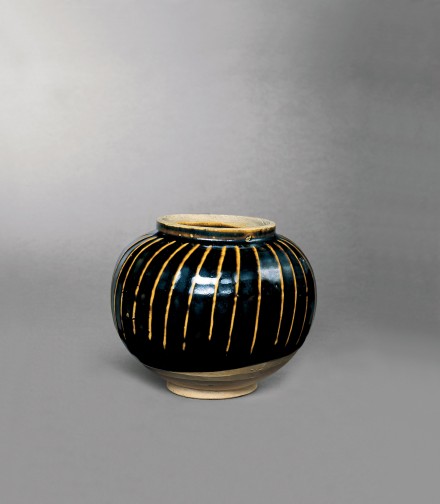J.J. Lally & Co., Oriental Art / New York City, New York
MenuPast Exhibition
Early Chinese Ceramics: An American Private Collection
March 28 - April 16, 2005

24.
A WHITE-RIBBED BLACK-GLAZED GLOBULAR JAR
Northern Song/Jin Dynasty, A.D. 12th Century
the almost spherical rounded body decorated with ribs of white slip applied in slightly slanted vertical lines starting high on the shoulder and extending down towards the base, under a shiny dark brownish-black glaze streaked with russet brown, thinning to light brown at the ribs and neck, and pooling to mirror-black well above the slightly flared ring foot revealing the buff-colored stoneware body, the short cylindrical neck with knife-cut rim wiped clean of glaze, the interior with a thin layer of brown glaze.
Diameter 5 1⁄2 inches (14 cm)
Ex Collection Robert M. Ferris IV, Windsor, Vermont.
Compare a similar brown-glazed ribbed jar from the Seligman Collection, now in the British Museum, London, illustrated by Ayers in The Seligman Collection of Oriental Art, Vol. II, London, 1964, Pl. XLVIII, no. D132; in Oriental Ceramics: The World’s Great Collections, Vol. 5, Tokyo, 1981, no. 122; and again by Wirgin in Sung Ceramic Designs, Stockholm, 1970, Pl. 53j.
A smaller jar of closely related form, decorated in the same manner but with the white ribs arranged in widely space groups of three, is illustrated in Sekai Toji Zenshu (Ceramic Art of the World), Vol. 12, Song Dynasty, Tokyo, 1977, p. 243, no. 245.
Examples of this well known group of white-ribbed black-glazed ceramics in five other shapes are illustrated by Mowry in Hare’s Fur, Tortoiseshell and Partridge Feathers: Chinese Brown-and Black-Glazed Ceramics, 400–1400, Cambridge, 1996, pp. 173–184, nos. 60–64. In his commentary on the group, Mowry points out that these ribbed vessels were produced at several different northern kilns, and shards of this type of ware have been excavated in Shandong province as well as at numerous kiln sites in Hebei and Henan provinces.
北宋 黑釉直肋紋罐 徑 14 厘米
24.
A WHITE-RIBBED BLACK-GLAZED GLOBULAR JAR
Northern Song/Jin Dynasty, A.D. 12th Century
Diameter 5 1⁄2 inches (14 cm)